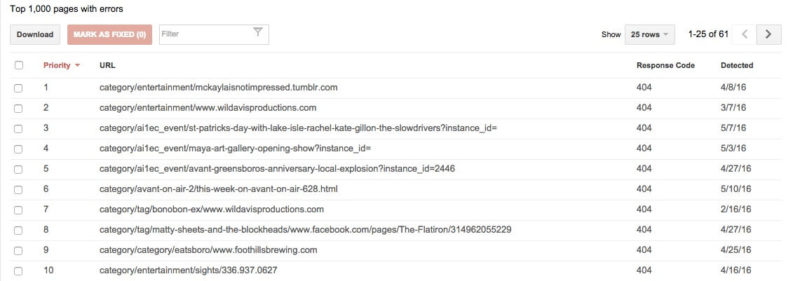5 essential skills that great link builders know
Think that building links is all a good link builder needs to do? Contributor Julie Joyce lists the five critical tasks that separate the great link builders from the mediocre ones.
 Awhile back, I wrote an article about how link builders need to do more than just build links. It’s not a novel concept at all, at least not among people who understand that nothing should exist in a bubble in SEO or marketing.
Awhile back, I wrote an article about how link builders need to do more than just build links. It’s not a novel concept at all, at least not among people who understand that nothing should exist in a bubble in SEO or marketing.
However, no matter how hard Google cracks down on poor linking practices, linking itself is still essential. You have no idea how many business owners say to me that “we’ve got everything working right except for the links.” And they still assume that if we just throw about 10 links at their site, they’ll shoot up from page 3 to spots 1–3. Sometimes they’re right, but most of the time they aren’t.
As a person who specializes in links, I often find that my opinion isn’t welcome when it comes to anything outside of link building. I did technical and general SEO for years before getting into link building, so I know that links don’t solve all problems and they can easily create further trouble if done improperly, depending upon how much risk a link profile can tolerate. For that reason alone, in my opinion, it’s not just nice if a link builder knows about more than links. It’s absolutely critical.
So what do they need to know and understand in order to do the best job possible? Here are my (current) top five.
1. How to analyze a site in terms of its overall authority and relevance
This is the most frequent issue my team has with finding good placements. It’s easy to have tunnel vision when you’re searching for a good, relevant piece of content and you discover a subpage that seems to check all the right boxes.
That page itself might be amazing. It might be well-written, have some good comments and social signals and be relevant to your site. But when you look at the rest of the site where the page exists, you find nothing but poor writing, random and thin content and so on.
Just as good links in a link profile can be outweighed by bad ones, good content on a site can be outweighed by poor content overall. Maybe you found a good subpage when you looked through the first 20 pages of the Google SERPs using some crazy keyword variation that you brainstormed when you started to get frustrated. Maybe that particular page ranks well for a decent term.
But if you look for the contact information, and it’s a 404, and then you do a site search and notice that many of the pages have injected spam content in them, you need to ask yourself: Do you really want to be associated with that site?
2. How to communicate effectively and efficiently, whether it’s by phone, via email or on social media
Good communication skills can get you very far in life. In the past, we’ve employed link builders who sent me such long and rambling emails that I’d have to read them three times to understand what point they were making or what question they were asking. I’ve had clients do the same thing.
I don’t have time to re-read anything three times, and I don’t know anyone who does. When we’re all getting 100 or more unsolicited emails every day, the ones that get noticed and read aren’t the ones that take 15 minutes to get through and understand.
I get a fair number of emails asking me to include a link to someone’s site on my agency site and on another site that I own. I do read all of them, usually, but that is because I use many of them as examples of what not to do.
Most of them go into great detail about what they want from me. If they didn’t amuse me, I’d delete them immediately. Even if I were open to just slapping a link on the site for someone, I certainly wouldn’t be doing it for the ones who use four paragraphs to tell me why the scholarship link on my site really isn’t the best choice for my viewing audience.
3. How to crawl a site and identify crawl and redirect errors
This helps prevent your site from losing out to broken link builders and also improves the user experience.
I really hate it when I see a 30-page site that has nearly 100 crawl errors. I hate it when there are redirect chains and pages that have both non-www AND www versions. It’s irritating when you see internal links that go through unnecessary redirects. It’s still so common, though.
While I’d obviously love to be able to find broken link opportunities myself, I never want my clients to be the ones losing links to broken link builders. You need to be able to check to see which inbound links are 404ing for your site, so you can figure out what to do.
You also need to be able to identify redirect issues. I recently dealt with a site that had around 20 unnecessary internal redirects on every single page.
I still encounter sites that don’t 301 redirect one version of the site to the other one (meaning a non-www and a www version.) If you get enough redirect chains, you can have serious trouble doing well these days.
4. How to keep an eye on the balance of a link profile
I use Majestic for this, as I really like their Anchor Text graph, but you can use any tool you like, as long as it helps you identify when something’s out of whack.
If you see that 75 percent of the anchors are one specific keyword, it’s time to speak up. I also check to see if there are any crazy new links popping up, or anything that just looks off to me.
Most of our current clients have SEOs on staff, so we don’t always “need” to check this out; however, sometimes there’s an oversight. Maybe multiple link teams are using the same anchors or someone’s building some really low-quality links. I like to get a good idea of everything that’s going on when I’m building links, because you can’t always depend on clients to let you know.
5. How to run at least one key report that helps nail down when things went wrong and ferret out what could have happened
There are two critical places that I turn for this:
Moz’s Algorithm Change History lists major changes all the way back to 2000 (!!!!!) and is always being updated. This is utterly invaluable to me. I already have a good idea of major updates and when they occurred, but it’s still nice to have it all listed in one spot like this. Additionally, this page lists updates that I’ve never seen affect the sites I work with, so I always check here if I see something new in a profile.
Glenn Gabe’s post on how to identify the low-quality pages that may have been hit by Panda was a total eye-opener for me because the technique he lists for finding the pages that have dropped is also insanely useful for many other things.
Maybe you all knew how to do this and do a date comparison and quickly figure out which pages dropped, but I didn’t. And, like I say, I’ve since used this technique to identify all sorts of issues. I always like to check to see if any referral links to my own site drop off or begin to perform better and also check how well the site is doing in social media.
I know there are countless other tasks that a link builder should be able to perform, but these are my top five.
No matter what your specialty is, you need to learn as much as you can about everything else in the environment. Link building works best when you’re considering the whole marketing presence of a site, not just a part of it.
Contributing authors are invited to create content for Search Engine Land and are chosen for their expertise and contribution to the search community. Our contributors work under the oversight of the editorial staff and contributions are checked for quality and relevance to our readers. The opinions they express are their own.
Related stories
New on Search Engine Land



